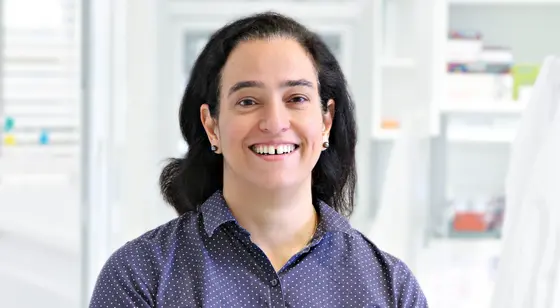What is special about the ERC's “Proof of Concept“ grants is that only those who already receive ERC funding can apply for it. The Research Council thus wants to enable scientists to test and develop possible areas of application for their research results obtained in an ERC-funded project.
On the basis of her ERC Consolidator Grant, which was approved in 2016, Nina Papavasiliou has now already been able to acquire the second ‚Proof of Concept' grant. Her current idea: to channel therapeutic genes as precisely as possible into target cells, she relies on a type of artificial exosomes. Biologists use this term to describe tiny membrane vesicles that are secreted by the cell and can carry a molecular cargo inside them.
Papavasiliou wants to equip the membrane of these vesicles with molecules that dock precisely to certain surface proteins of the target cells. The docking maneuver causes the vesicle and the target cell to fuse, and the molecular cargo finds its way into the interior of the target cells.
The DKFZ researcher uses the membranes of the blood parasite Trypanosoma brucei, the pathogen that causes sleeping sickness, for the artificial exosomes. These membranes are covered in extremely high density with a surface protein of the pathogen. Using an enzymatic reaction Papavasiliou can bind any molecules to this surface protein that enables precise targeting of all types of target cells.
For gene therapies, the vesicles could be loaded with therapeutic genes and thus represent an alternative to the viral gene ferries that have been mostly used up to now but are often problematic. For RNA vaccinations against cancer cells, it would also be possible to transport mRNA molecules inside the vesicles. By binding the vesicles to a cancer-specific protein, the mRNA molecules would be specifically delivered only into the tumor cells.
Biologist Nina Papavasiliou received her PhD from Rockefeller University in New York in 1998, where she headed an immunology research department until 2015. Since 2016, the U.S. American has headed the Division Immune Diversity at the German Cancer Research Center. For her outstanding research achievements, Nina Papavasiliou was accepted as a member of the European Molecular Biology Organization (EMBO) in 2020. In 2021, she was awarded the first-ever DKFZ Innovation Award.
A picture of Nina Papavasiliou is available for download:
Papavasiliou.jpg
Note on use of images related to press releases
Use is free of charge. The German Cancer Research Center (Deutsches Krebsforschungszentrum, DKFZ) permits one-time use in the context of reporting about the topic covered in the press release. Images have to be cited as follows: “Source: Jutta Jung / DKFZ “.
Distribution of images to third parties is not permitted unless prior consent has been obtained from DKFZ's Press Office (phone: ++49-(0)6221 42 2854, E-mail: presse@dkfz.de). Any commercial use is prohibited.



